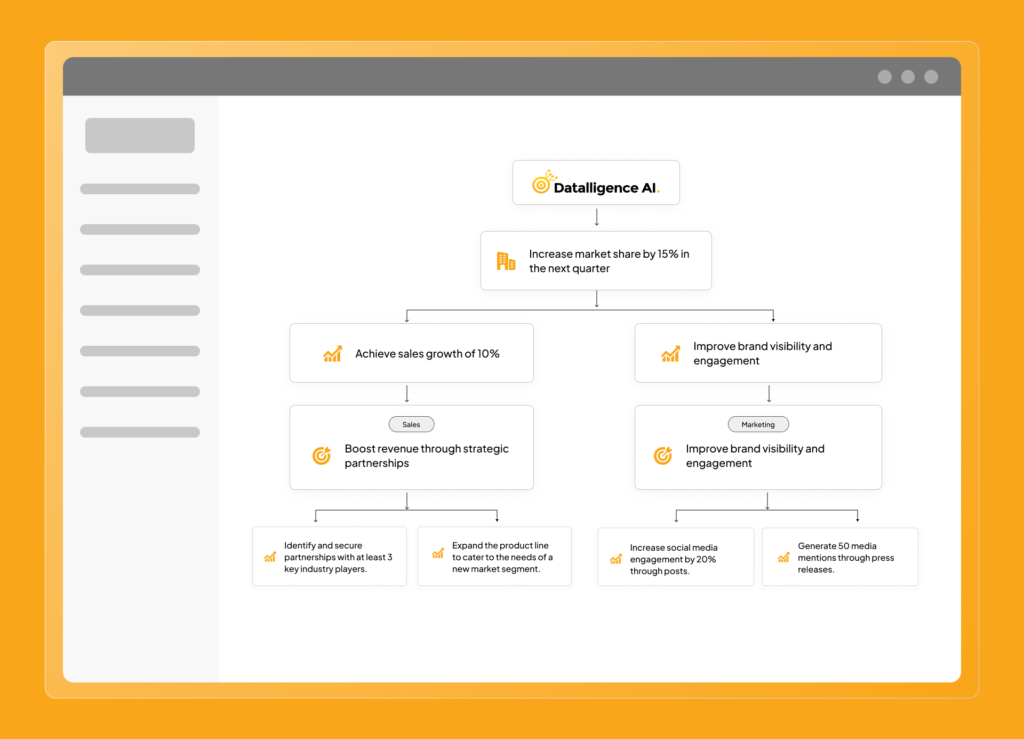What are Cascading OKRs
 Cascading OKRs is a strategic goal-setting framework where high-level objectives are broken down and aligned across different levels of an organization, ensuring alignment, focus, and accountability throughout the hierarchy.
Example: If a company’s top-level objective is “Increase Market Share,” cascading OKRs might include:
Cascading OKRs is a strategic goal-setting framework where high-level objectives are broken down and aligned across different levels of an organization, ensuring alignment, focus, and accountability throughout the hierarchy.
Example: If a company’s top-level objective is “Increase Market Share,” cascading OKRs might include:
- Marketing Team OKR: “Launch targeted campaigns to reach new customer segments, resulting in a 15% increase in website traffic.”
- Sales Team OKR: “Increase conversion rates by 10% through improved sales processes and lead nurturing.”
- Product Team OKR: “Enhance user experience, leading to a 20% increase in customer satisfaction scores.”
How do Cascading OKRs Work?
 The concept of cascading OKRs involves breaking down high-level objectives into smaller, more specific objectives and key results, which are then further cascaded down to individual teams and employees.
The concept of cascading OKRs involves breaking down high-level objectives into smaller, more specific objectives and key results, which are then further cascaded down to individual teams and employees.
Here’s how Cascading OKRs work
Company Level OKRs (Top-Level OKRs):
The process starts at the highest level of the organization, often with the executive team or senior leadership defining the company’s top-level objectives. These objectives are typically ambitious and strategic, reflecting the organization’s overall mission and vision.Department/Team Level OKRs:
Once the company-level OKRs are defined, they are then cascaded down to various departments, teams, and units within the organization. Each of these units creates its own set of objectives that are aligned with and contribute to the achievement of the top-level objectives. These objectives should be specific, measurable, achievable, relevant, and time-bound (SMART).Individual Level OKRs:
From the department or team level, individual contributors define their own OKRs that align with their team’s objectives. These individual OKRs should directly support the team’s objectives and, in turn, contribute to the achievement of the company’s overarching goals.Benefits of Cascading OKRs
Cascading OKRs is a strategic approach that ensures alignment and synergy throughout an organization’s hierarchy. It involves the systematic alignment of objectives and key results from top-level leadership down to individual contributors or teams. This approach offers several benefits: Fostering Strategic Alignment Cascading OKRs fosters a synchronized approach across all tiers of an organization. It orchestrates the seamless alignment of goals and key outcomes from upper management to individual contributors or teams. Cross-Functional Collaboration Cascading OKRs encourages collaboration between different departments and teams. When objectives are interconnected, teams need to work together to achieve common goals, leading to improved cross-functional cooperation. Resource Allocation Cascading OKRs enable better resource allocation as they provide insights into where resources (such as time, budget, and manpower) should be directed for maximum impact. [/fusion_text][/fusion_builder_column]Transparency:
Cascading OKRs promote transparency by making goals and progress visible at all levels of the organization. This transparency fosters a culture of openness and encourages collaboration.
Learning and Improvement:
As objectives are cascaded, teams and individuals can pick up tips and tricks from one another about how to do things best. Through cross-learning, the organization as a whole may experience innovation and continuous improvement.
Is Cascading OKRs Right for Your Startup?
Determining whether Cascading OKRs are suitable for your company depends on various factors such as your organizational structure, goals, and management style.
Cascading OKRs can be beneficial for companies with clear hierarchies, as they allow for the alignment of objectives from top leadership down to individual teams, promoting a unified focus. This approach fosters collaboration and ensures everyone is working towards the same overarching goals.
However, it might not be ideal for all organizations, especially those that value flexibility and autonomy at all levels. Ultimately, the decision should be based on your company’s specific needs and culture.
Pros and Cons of Cascading OKRs
Pros:- Holistic View of Progress:
- Rapid Alignment during Change:
- Transparency:
- Benchmarking:
- Strategic Alignment:
- Complexity:
- Risk of Misalignment:
- Narrow Focus:
- Time-Consuming:
- Inflexibility:
- Assuming that the strategy is flawless, cascading OKRs make it challenging to adapt to shifting market conditions.
- The cascading model can be challenging for agile and innovative organizations to implement because it is frequently seen as a holdover of a command-and-control mindset.
- Cascading OKRs can sometimes lead to an excessive focus on short-term objectives, neglecting longer-term strategic goals. It’s important to strike a balance between immediate results and long-term organizational vision.
- When using cascading OKRs, it is important to define the key metrics and result areas before starting the cascade with each team member.
- If OKRs are tied to performance evaluations or bonuses, cascading can create misaligned incentives, as teams may focus on short-term gains rather than long-term strategic goals.











